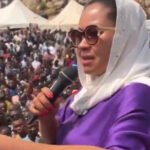A coalition of eight civil society organisations (CSOs) in Nigeria has called on 2023 presidential candidates to declare their plans to address the issue of vote-buying.
The CSOs, at a press conference on Thursday in Abuja, also stressed the need for Africa’s most populous nation to work towards achieving inclusive governance.
According to the CSOs, including Accountability Lab Nigeria, Connected Development (CODE), the Socio-Economic Rights and Accountability Project (SERAP), BudgIT, the Centre for Journalism Innovation and Development (CJID), Paradigm Leadership Support Initiative, Yiaga Africa, and Enough is Enough, also urged the candidates to publicly declare their assets in compliance with the country’s 2022 Electoral Act.
Some CSOs had reported in July 2022 that they observed open negotiations to buy and sell votes in the 2022 Osun State governorship election.
In different reports, the CSO, including The Nigeria Civil Society Situation Room, Centre for Democracy and Development (CDD), and Yiaga Africa, said the buying and selling of votes was well coordinated by polling agents in many polling units.
Speaking on behalf of the coalition, the Country Director of Accountability Lab Nigeria, Odeh Friday, decried what the CSOs called the lack of public data on the declaration of assets of potential political candidates.
‘Despite the existence of a legal framework for asset declaration for political office holders, the level of compliance is unknown as data on asset declaration for office holders is not available to the public’, they said.
‘The lack of public data on the assets of potential political aspirants provides an avenue for opacity and a lack of accountability, thereby, fueling political corruption’.
They added, ‘The monetisation of politics was the main headline during the political parties’ primaries and has become a pointer to how vote-buying and selling will play a disruptive role in the 2023 elections.
‘This has also affected the value of the naira, as aspirants now deal in and distribute major international currencies, especially the dollar.
‘In the last couple of weeks, the dollar to naira exchange rate peaked at N715 on the parallel market due to the undue pressure on the value of the naira. Vote-buying has become a widespread practice, where democracy has struggled to be fully consolidated due to Nigeria’s entrenched corrupt political class, trapping citizens in self-sabotaging, subservient relationships with political leaders’.
They also called on the country’s electoral umpire, the Independent National Electoral Commission (INEC), to submit its budget report to the National Assembly for scrutiny.
According to the CSOs, Nigeria needs to work towards achieving inclusive governance where all classes of citizens and underserved groups have every opportunity to participate in governance processes effectively.
Photo source: INEC




